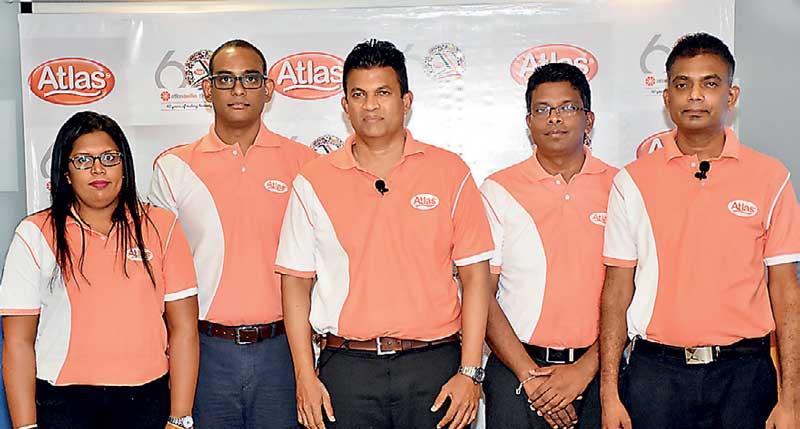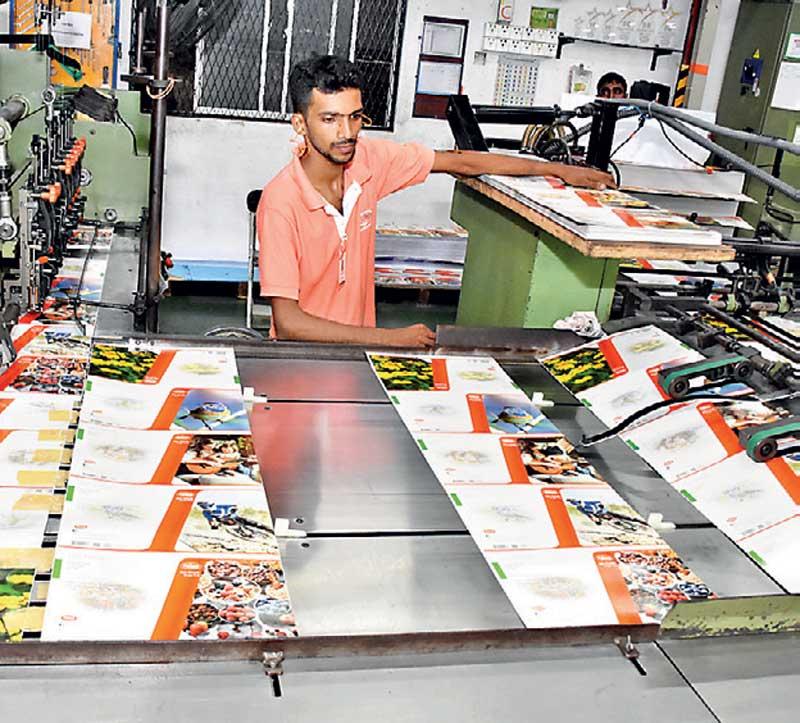05 Jul 2019 - {{hitsCtrl.values.hits}}

From left : Atlas Axillia Chief Human Resource Officer Lalani Weerarachchi, Atlas Axillia Director-Finance Dayan Gunasekara, Atlas Axillia, Managing Director Asitha Samaraweera, Atlas Axillia Director-Sales Indrajith Binduhewa and Atlas Axillia Chief Operating Officer Viraj Jayasooriya
Pic by Kushan Pathiraja

Inside the Atlas production plant in Peliyagoda
Pix by Kushan Pathiraja
By Nishel Fernando
Sri Lanka’s leading school and office stationery brand, Atlas has become a victim of widespread anti-Muslim boycott campaign allegedly launched by some of its competitors and parties with vested interests following the Easter Sunday attacks on April 21.
“Taking advantage of the situation that arose in the aftermath of Easter Sunday attacks, certain parties launched a defamation campaign against local businesses to gain short-term competitive advantages.
“Unfortunately, we have also been on the receiving end of such a malicious campaign,” Atlas Axillia, Managing Director Asitha Samaraweera told reporters this week.
Atlas Axillia officials said the boycott campaign was launched on social media platforms a week after the Easter Sunday attacks. There had been about 540 posts and comments within a week starting from April 28, prompting hate speech and fake news against Atlas.
The company said around 400 of these posts were created by fake accounts on Facebook while the remaining 140 defamatory comments and posts were created by persons linked to some of the competitor firms of Atlas and those with vested interests.
Hemas Group Corporate Communications Head Shiromi Masakorala said 13 such posts had reached 2.1 million Facebook users.
During past 30 days, 65 malicious posts containing fake news and defamatory comments against Atlas had been circulated among 1.6 million Facebook users.
Most of them however had been taken down as they violate terms and conditions of Facebook.
Atlas has already lodged several complaints with the Criminal Investigation Department (CID) against the perpetrators behind spreading fake news and the defamatory campaign on social media against them.
Atlas Axillia Director-Sales Indrajith Binduhewa told Mirror Business that the involvement of three competitors of Atlas behind this smear campaign has already been identified.
Managing Director Samaraweera said Atlas is ready to pursue civil litigation against these firms and vested interest parties. “We are prepared to take legal action. We are sending letters of demand to some of these individuals who are responsible for these attacks,” he said.
However, he said there are also large quantities of fake news being circulated on other online communication platforms such as WhatsApp, which is hard to combat.
Further, Samaraweera said that another campaign at grassroot-level has been underway advocating traders, teachers and other community leaders to boycott Atlas products. “Even 10-year old children are being asked not to use Atlas products. Some of these children are being bullied and punished in schools for using Atlas products.
“This is truly a pathetic situation and very disheartening. This hate campaign, at the end of the day, is having a much larger impact on the minds of our little children; the young minds are being corrupted for petty short-term financial gains,” he lamented.
Meanwhile, Samaraweera warned of economic consequences to the country stemming from such hate campaigns while pointing out that Atlas saves Rs 2.5 billion a year in foreign exchange for the country.
“It undermines hard work of 1,200 employees of this company and thousand of dependents and suppliers. This will ultimately impact the country’s economy,” he said.
Due to the seasonal nature of the business, Atlas officials said that their sales figures are yet to be impacted. However, if the current environment persists, they feel there will be considerable impact on the firm going forward.
Atlas has already launched a programme to fight the boycott campaign by educating traders, schools and the public about the facts.
While calling for stronger policies and regulations against hate speech, Samaraweera urged the industry bodies, civil societies and politicians to join the fight against hate speech.
Atlas has a 50 percent market share in school and office stationery and the market consists of 15 players. However, Binduhewa noted that other players are mostly importers as they don’t make a considerable value addition to their products locally. The company was founded by Madanayake family in 1951, and Hemas Group led by Esufally family in 2018 acquired 75.1 percent stake in Atlas on a view to support the further expansions of the firm. Nirmal Madanayake retains over 24 percent minority stake in Atlas.
Atlas Axillia mulls aggressive expansion to South-East Asia during next two years, which may include setting up production plants in the region.
“There’s big push to build up a substantial business in South-East Asia and plans are currently underway. There are different strategies we are looking at. In some markets, it makes sense to get an international distributor.
“In some other markets, we may set-up a joint venture in terms of plants. Those plans are still under negotiation,” Atlas Axillia Managing Director Asitha Samaraweera revealed.
According to officials, the firm’s current export volumes are not significant compared to domestic sales volumes. However, Samaraweera remarked that export volumes could increase by 300-400 percent in coming years.
Even though setting up of production plants outside of Sri Lanka are on cards for the future, Samaraweera stressed that value addition within Sri Lanka will remain as the key priority of Atlas.
Further, Atlas is looking at introducing a new product range to the market shortly. “We are looking at certain new types of pens, innovative books, new bags, pastels and water bottles,” Samaraweera stressed. Despite the shifting preferences towards digitalization, Atlas officials noted that the demand for stationary products is growing at around 8-10 percent per annum in Sri Lanka.
15 Nov 2024 14 minute ago
15 Nov 2024 1 hours ago
15 Nov 2024 1 hours ago
15 Nov 2024 1 hours ago
15 Nov 2024 2 hours ago